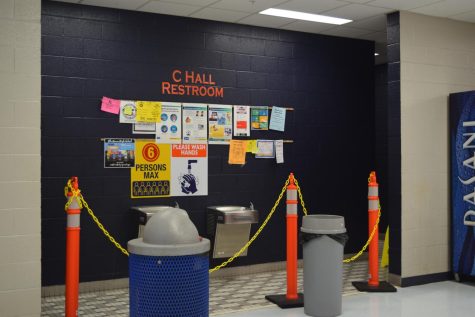Will You Be Exempt From Finals?
Area Exam Exemption Policies Differ
With an abnormally large number of students afflicted by the flu this season, many students are finding themselves concerned about the number of days they missed affecting their exam exemptions.
Current Rutherford County Policy includes exemption from final exams based on grades and absences as attendance incentives. The specific grades and absences are listed below.
| The criteria for final exam exemption are as follows: | |
| Full year classes: | Semester Classes: |
| 8 absences- A average | 4 absences- A average |
| 6 absences- B average | 3 absences- B average |
| 4 absences- C average | 2 absences- C average |
| 2 absences- D average | 1 absences- D average |
This is applied on a class to class basis and excused absences, such as personal illness, doctor’s excuses, parent notes, and nurse’s excuses still count toward the absence total. Only field trips and school activities do not count.
While this policy does reward students for attending, some argue it makes students feel they have to attend school when they are ill.
For example, a student taking Spanish II who has a 103 average is required to take finals if they miss more than eight nonschool-related absences in the academic calendar year. Yet a student with a 75 in the same class who attends class every day will be exempt.
“Final Exam Exemptions (other than state mandated End of Course Exams)-Eligibility for exam exemptions (other than state mandated End of Course Exams) begins the first day of school. The final decision regarding final exemption of any student will be determined by the principal/designee. Any student who has been suspended (in-school or out-of-school) is not eligible for exemptions,” according to the Tennessee State policy. To read the policy, go to https://bitly.is/1g3AhR6.
The Rutherford County Attendance Officer says that some students can be exempt because of extenuating circumstances. This decision is left up to the student’s principal on a case to case basis.
While Tennessee has laws regulating chronic absenteeism and truancy, they do not state that incentives for attendance are required.
In 2015, following pleas of several students, Cheatham County changed their absence policy.
In order to be exempt, a student must earn a 93 or above in a non-tested classes. In 2017 Cheatham County made this policy permanent.
The data below compares grades 9-12 in Cheatham County in 2015-2016 to Rutherford County and Blackman High School, in the same year.
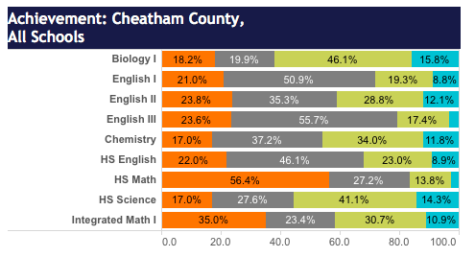
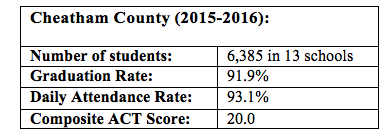
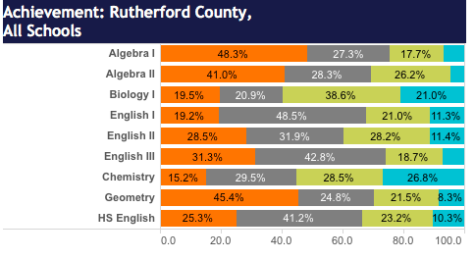

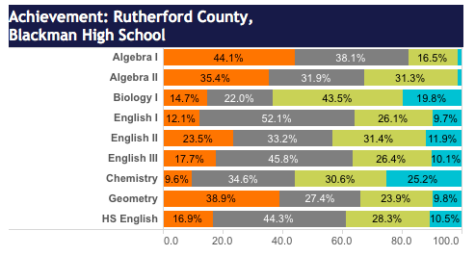
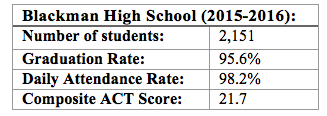
![]()
While notable advantages to the strict attendance policy exist, the changes in recorded ACT and EOC scores do not appear to be significant. The issue of whether present students actually have better test scores overall can also be called into question, as well as the argument that things, like personal illness, are unavoidable and should not negatively impact students who maintain satisfactory grades in the class.
The reason this policy was implemented is well supported by science: student attendance has a direct correlation to student achievement. Students who attend less than 90% of school days have a national graduation rate nearly half that of students who attend every day.
Likewise, many colleges have begun implementing their own attendance policies, allowing professors to deny students credit for their class if they miss a specified number of days.
The reward system in Rutherford County Schools helps to prepare students for college by getting them used to attending class on a daily basis. This is supported by a graph of a 2011 national data set shown below. It is noted that no student with 100% attendance earned less than a 2.85 GPA and no student with a 4.0 attended less than 96% of class.
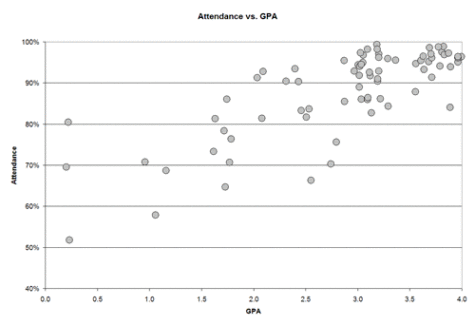
When students were asked how they felt about the policy, their responses varied depending on their own experiences.
“I think it is unfair that medical emergencies are counted towards taking your finals. I had an emergency surgery this year and had to miss a week of school, and now I have to take all of my finals. I think if you have to have an unexpected surgery or illness, it shouldn’t affect your finals especially if you’re doing well in the class,” said senior Devin Lampitt.
Blackman High School Assistant Principal Scott Lawless said he believes there are both positives and negatives to the policy. He said that a policy, like the one Rutherford County enforces, is overall beneficial to many students to “motivate them to be present and motivate them to get good grades.” He also emphasized that it could be advantageous if all students were to take exams to prepare them for college.
Some students have expressed concern that the reward system, currently focused on attendance rather than on performance, is problematic.
“As a student [who] has had As and Bs through all of high school, and several of my friends that have had Cs and Ds, it doesn’t seem fair that both of us can be exempt from finals when I have studied more and worked harder. But I do appreciate the fact that students who put more time in class do get rewarded by not having to take their finals,” said junior Stephanie Melliere.
The policy provides an opportunity for students that have not always maintained high grades in their classes to be exempt.
“I don’t maintain A’s in all of my classes, so because of the policy I have never had to take a final. I like the policy in that way because I can still be rewarded even if I struggle in a class by not having to take my finals. However, I don’t think that valid absences and doctor’s notes should count against you because everyone gets sick, and if I have a bad grade in a class, it’s not fair that I can only miss two or three days without having to take my finals.” said junior Emily Stacey.
Bottom line: attendance affects grades, whether you like the current absence policy or not.
Sources
https://www.tn.gov/education/data/report-card.html
https://nces.ed.gov/pubs2009/attendancedata/chapter1a.asp

3 Words That Describe Yourself: Hardworking, Motivated, and Organized
Favorite Food: Pizza
Hobbies: Photography
Favorite Hang Spot: My room
Why did...





